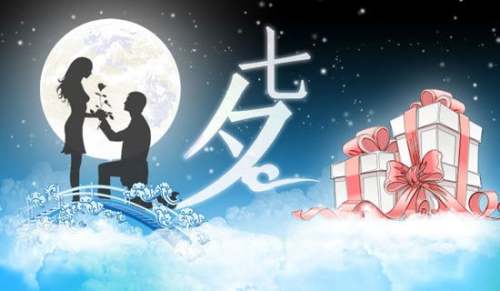七夕节的由来英文
七夕节的`由来英文

Qixi Festival (Chinese: 七夕節),also known as the QiqiaoFestival (Chinese: 乞巧節),is a Chinese festival that celebrates the annual meeting ofthe cowherd and weaver girl in Chinesemythology. It falls on the seventh day of the 7th month on theChinese calendar. It is sometimes called the Double Seventh Festival, the ChineseValentine's Day, or the MagpieFestival. Thisis an important festival, especially for young girls.
The festival originated from the romantic legend of two lovers,Zhinü and Niulang, who were the weaver maid and the cowherd, respectively. Thetale of The Weaver Girl andthe Cowherd has beencelebrated in the Qixi Festival since the Han Dynasty.The earliest-known reference to this famous myth dates back to over 2600 yearsago, which was told in a poem from the Classic ofPoetry. The festival inspired Tanabata in Japan and Chilseok in Korea.
Mythology
The general tale is about a love storybetween Zhinu (the weaver girl, symbolizing Vega) and Niulang (thecowherd, symbolizingAltair).Their love was not allowed, thus they were banished to opposite sides of theSilver River (symbolizing the Milky Way). Once a year, on the 7th day ofthe 7th lunar month, a flock of magpies would form a bridge to reunite thelovers for one day. There are many variations of the story. A variationfollows:
A young cowherd, hence Niulang (Chinese: 牛郎; literally: "cowherd"), cameacross a beautiful girl—Zhinü (simplified Chinese: 织女; traditional Chinese: 織女; literally: "weavergirl"),the Goddess's seventh daughter, who had just escaped from boring heaven to lookfor fun. Zhinü soon fell in love with Niulang, and they got married without theknowledge of the Goddess. Zhinü proved to be a wonderful wife, and Niulang tobe a good husband. They lived happily and had two children. But the Goddess ofHeaven (or in some versions, Zhinü's mother) found out thatZhinü, a fairy girl, had married a mere mortal. The Goddess was furious andordered Zhinü to return to heaven. (Alternatively, the Goddess forced the fairyback to her former duty of weaving colorful clouds, a task she neglected whileliving on earth with a mortal.) On Earth, Niulang was very upset that his wifehad disappeared. Suddenly, his ox began to talk, telling him that if he killedit and put on its hide, he would be able to go up to Heaven to find his wife.Crying bitterly, he killed the ox, put on the skin, and carried his two belovedchildren off to Heaven to find Zhinü. The Goddess discovered this and was veryangry. Taking out her hairpin, the Goddess scratched a wide river in the sky toseparate the two lovers forever, thus forming the Milky Way betweenAltair and Vega. Zhinü must sit forever on one side of the river, sadly weavingon her loom, while Niulang watches her from afar while taking care of their twochildren (his flanking stars β and γ Aquilae orby their Chinese names Hè Gu 1 and Hè Gu 3). But once a year all the magpies inthe world would take pity on them and fly up into heaven to form a bridge (鹊桥,"the bridge of magpies", Que Qiao) over the star Deneb in the Cygnus constellation so the lovers may betogether for a single night, which is the seventh night of the seventh moon.
Traditions
Young girls partake in worshiping thecelestials (拜仙) during rituals. They go to the local temple to pray toZhinü for wisdom. Paper items are usually burned as offerings. Girls mayalso recite traditional prayers for dexterity in needlework, which symbolizethe traditional talents of a good spouse. Divination could take place todetermine possible dexterity in needlework. They make wishes for marryingsomeone who would be a good and loving husband. During the festival, girls makea display of their domestic skills. Traditionally, there would be contestsamongst young girls who attempted to be the best in threading needles underlow-light conditions like the glow of ember or a half moon. Today, girlssometimes gather toiletries in honor of the seven maidens.
The festival also held an importance fornewly-wed couples. Traditionally, they would worship the celestial couplefor the last time and bid farewell to them. The celebration stood symbol for ahappy marriage and showed that the married woman was treasured by her newfamily.
During this festival, a festoon isplaced in the yard. Single and newly-wed women make offerings to Niulang andZhinü, which may include fruit, flowers, tea, and face powder.After finishing the offerings, half of the face powder is thrown on the roofand the other half divided among the young women. It is believed that by doingthis, the women are bound in beauty with Zhinü. Tales say that it will rain onthis fateful day if there's crying in heaven. Other tales say that you can hearthe lovers talking if you stand under grapevines on this night.
On this day, the Chinese gaze to the skyto look for Vega and Altair shiningin the Milky Way, while a third star formsa symbolic bridge between the two stars. It was said that if itrains on this day that it was caused by a river sweeping away the magpiebridge, or that the rain is the tears of the separated couple. Based on the legendof a flock of magpies forming a bridge to reunite the couple, a pair of magpiescame to symbolize conjugal happiness and faithfulness.
【七夕节的由来英文】相关文章:
月饼的由来07-27
火锅的历史和由来07-10
世界动物日的由来07-06
国际护士节的由来07-10
普通话的由来介绍07-10
猫屎咖啡的由来介绍07-10
明朝国号明字的由来07-06
世界地球日的由来07-06
关于圣诞节的由来07-06
关于元旦节的由来07-06